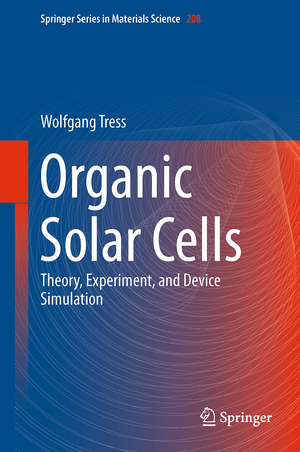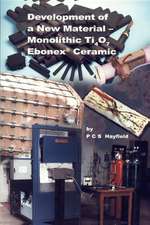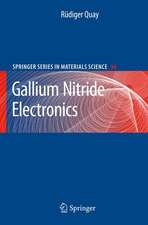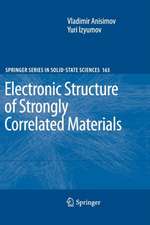Organic Solar Cells: Theory, Experiment, and Device Simulation: Springer Series in Materials Science, cartea 208
Autor Wolfgang Tressen Limba Engleză Hardback – 5 dec 2014
The main focus is on the interpretation of the current-voltage characteristics (J-V curve). This very standard measurement technique for a solar cell reflects the electrical processes in the device. Comparing experimental to simulation data, the author discusses the reasons for S-Shaped J-V curves, the role of charge carrier mobilities and energy barriers at interfaces, the dominating recombination mechanisms, the charge carrier generation profile, and other efficiency-limiting processes in organic solar cells. The book concludes with an illustrative guideline on how to identify reasons for changes in the J-V curve.
This book is a suitable introduction for students in engineering, physics, material science, and chemistry starting in the field of organic or hybrid thin-film photovoltaics. It is just as valuable for professionals and experimentalists who analyze solar cell devices.
| Toate formatele și edițiile | Preț | Express |
|---|---|---|
| Paperback (1) | 953.52 lei 6-8 săpt. | |
| Springer International Publishing – 23 aug 2016 | 953.52 lei 6-8 săpt. | |
| Hardback (1) | 959.67 lei 6-8 săpt. | |
| Springer International Publishing – 5 dec 2014 | 959.67 lei 6-8 săpt. |
Din seria Springer Series in Materials Science
- 18%
 Preț: 1820.22 lei
Preț: 1820.22 lei - 18%
 Preț: 776.09 lei
Preț: 776.09 lei - 24%
 Preț: 689.68 lei
Preț: 689.68 lei - 18%
 Preț: 968.96 lei
Preț: 968.96 lei - 20%
 Preț: 568.94 lei
Preț: 568.94 lei - 18%
 Preț: 953.65 lei
Preț: 953.65 lei - 18%
 Preț: 902.36 lei
Preț: 902.36 lei - 18%
 Preț: 953.65 lei
Preț: 953.65 lei - 20%
 Preț: 948.41 lei
Preț: 948.41 lei - 18%
 Preț: 1143.07 lei
Preț: 1143.07 lei - 18%
 Preț: 1111.53 lei
Preț: 1111.53 lei - 18%
 Preț: 1103.62 lei
Preț: 1103.62 lei - 18%
 Preț: 1225.94 lei
Preț: 1225.94 lei -
 Preț: 473.91 lei
Preț: 473.91 lei - 18%
 Preț: 782.42 lei
Preț: 782.42 lei -
 Preț: 433.47 lei
Preț: 433.47 lei - 18%
 Preț: 1116.40 lei
Preț: 1116.40 lei - 18%
 Preț: 946.24 lei
Preț: 946.24 lei - 18%
 Preț: 945.20 lei
Preț: 945.20 lei - 15%
 Preț: 641.20 lei
Preț: 641.20 lei - 18%
 Preț: 958.56 lei
Preț: 958.56 lei - 18%
 Preț: 1224.36 lei
Preț: 1224.36 lei - 15%
 Preț: 644.82 lei
Preț: 644.82 lei - 24%
 Preț: 833.43 lei
Preț: 833.43 lei - 24%
 Preț: 1060.33 lei
Preț: 1060.33 lei - 18%
 Preț: 964.10 lei
Preț: 964.10 lei - 18%
 Preț: 1224.36 lei
Preț: 1224.36 lei - 18%
 Preț: 1221.20 lei
Preț: 1221.20 lei - 18%
 Preț: 946.87 lei
Preț: 946.87 lei - 18%
 Preț: 1836.92 lei
Preț: 1836.92 lei - 15%
 Preț: 643.34 lei
Preț: 643.34 lei - 18%
 Preț: 1246.32 lei
Preț: 1246.32 lei - 18%
 Preț: 956.81 lei
Preț: 956.81 lei - 18%
 Preț: 953.52 lei
Preț: 953.52 lei - 15%
 Preț: 637.59 lei
Preț: 637.59 lei - 24%
 Preț: 1060.87 lei
Preț: 1060.87 lei
Preț: 959.67 lei
Preț vechi: 1170.33 lei
-18% Nou
Puncte Express: 1440
Preț estimativ în valută:
183.63€ • 192.24$ • 151.94£
183.63€ • 192.24$ • 151.94£
Carte tipărită la comandă
Livrare economică 05-19 aprilie
Preluare comenzi: 021 569.72.76
Specificații
ISBN-13: 9783319100968
ISBN-10: 3319100963
Pagini: 464
Ilustrații: XX, 464 p. 208 illus., 182 illus. in color.
Dimensiuni: 155 x 235 x 32 mm
Greutate: 0.85 kg
Ediția:2014
Editura: Springer International Publishing
Colecția Springer
Seria Springer Series in Materials Science
Locul publicării:Cham, Switzerland
ISBN-10: 3319100963
Pagini: 464
Ilustrații: XX, 464 p. 208 illus., 182 illus. in color.
Dimensiuni: 155 x 235 x 32 mm
Greutate: 0.85 kg
Ediția:2014
Editura: Springer International Publishing
Colecția Springer
Seria Springer Series in Materials Science
Locul publicării:Cham, Switzerland
Public țintă
GraduateCuprins
From the Contents: Introduction.- Photovoltaic Energy Conversion.- Organic Solar Cells.- Modeling.- Simulation Study on Single-Layer Bulk-Heterojunction Solar Cells.- Influence of Injection and Extraction Barriers on Open-Circuit Voltage and J-V Curve Shape studied at a Variation of Hole Transport Layer and Donor Materials.
Textul de pe ultima copertă
This book covers in a textbook-like fashion the basics or organic solar cells, addressing the limits of photovoltaic energy conversion and giving a well-illustrated introduction to molecular electronics with focus on the working principle and characterization of organic solar cells. Further chapters based on the author’s dissertation focus on the electrical processes in organic solar cells by presenting a detailed drift-diffusion approach to describe exciton separation and charge-carrier transport and extraction. The results, although elaborated on small-molecule solar cells and with focus on the zinc phthalocyanine: C60 material system, are of general nature. They propose and demonstrate experimental approaches for getting a deeper understanding of the dominating processes in amorphous thin-film based solar cells in general.
The main focus is on the interpretation of the current-voltage characteristics (J-V curve). This very standard measurement technique for a solar cell reflects the electrical processes in the device. Comparing experimental to simulation data, the author discusses the reasons for S-Shaped J-V curves, the role of charge carrier mobilities and energy barriers at interfaces, the dominating recombination mechanisms, the charge carrier generation profile, and other efficiency-limiting processes in organic solar cells. The book concludes with an illustrative guideline on how to identify reasons for changes in the J-V curve.
This book is a suitable introduction for students in engineering, physics, material science, and chemistry starting in the field of organic or hybrid thin-film photovoltaics. It is just as valuable for professionals and experimentalists who analyze solar cell devices.
The main focus is on the interpretation of the current-voltage characteristics (J-V curve). This very standard measurement technique for a solar cell reflects the electrical processes in the device. Comparing experimental to simulation data, the author discusses the reasons for S-Shaped J-V curves, the role of charge carrier mobilities and energy barriers at interfaces, the dominating recombination mechanisms, the charge carrier generation profile, and other efficiency-limiting processes in organic solar cells. The book concludes with an illustrative guideline on how to identify reasons for changes in the J-V curve.
This book is a suitable introduction for students in engineering, physics, material science, and chemistry starting in the field of organic or hybrid thin-film photovoltaics. It is just as valuable for professionals and experimentalists who analyze solar cell devices.
Caracteristici
Summarizes the current knowledge of electrical processes in organic devices Serves as a tutorial on organic solar cells Combines basics for students with ideas for research starters and with newest research results interesting for professionals Provides guidance to interpret experimental current-voltage data Includes supplementary material: sn.pub/extras


















